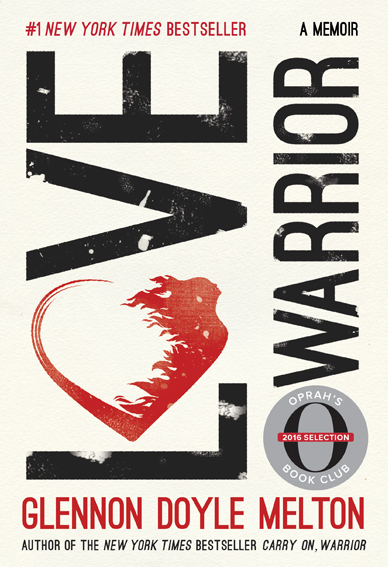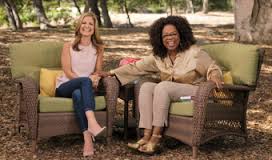Love Warrior

November 14, 2016
This review is a little different for me. I’m torn. I’m frustrated. I’m wondering how in the world things will progress for evangelical women. Or maybe I should say Xvangelicals.

I picked up Glennon Doyle Melton’s memoir, Love Warrior, from my library because I wanted to learn about other women. Some of them are my friends. I first saw excitement for Melton’s latest book announced by non-Christian friends on social media. I read the pitch for the book, about how Melton fought through bulimia and alcoholism to embrace motherhood, only to discover later in life that she would face the toughest rock bottom News of all---her husband was a serial adulterer. To cope with the unbearable agony, she wrote. She wrote and she wrote, and now she is sharing her story with all women because it is about self-discovery, love, mind, body, and soul. It’s about being a warrior. I knew the book would be a bestseller.
But then Melton’s name popped up as a speaker in the latest Belong Tour, accompanied by other familiar names such as Jen Hatmaker, Shauna Niequist, and Nichole Nordeman. Wait. Glennon Doyle is speaking with this crowd? I didn’t know that she even identified as a Christian. I did know that her book was now part of Oprah’s book club. Now I want to learn more about the women packing arenas to follow the New Christian Women.
But I’ll be honest. I also began reading Love Warrior with a high dose of, “here we go again…” I was incredibly skeptical. To my surprise, I didn’t have to force myself to finish Melton’s book. It has substance. She nails the “hidden rules” of society that girls pick up on at a very young age. Her depiction of body image, performance as life, pain, premarital sex, addiction, fear, and helplessness is gritty and enlightening. Her encounters with both the Roman Catholic and conservative evangelical churches live up to our worst stereotypes. Melton is a brilliant observer. She’s a good writer. Her insights are engaging. And she’s terribly honest. Terribly. I don’t know if I’m using that word in a positive or negative way. There were times where I felt like Melton really over shared, and I wondered about her family, her friends, and her kids. Was this fair to them? But I kept reading. Her story lives up to page-turner status.
Of course women love her. Melton tears away all the masks. She shares dirt about herself that makes the tabloids seem boring. We can compare ourselves to her and think we aren’t so bad after all. And we are rooting for her. As Melton shares her unedited inner thoughts, we recognize them as our own---except, this woman with a really messed up history sounds a lot smarter than us. Her brutal self-examination calls us out as well.
Melton isn’t the Christian author who makes you feel like you’re sitting across a table having a cup of coffee with her as you read. No. There’s nothing fluffy about her. And she’s no small talker. I like her. I’m embarrassed to admit this to myself, because Oprah.

But where is she going?
I wonder, as I’m reading this gritty book, how does she end up as a speaker in a Belong conference? There must be some sort of conversion story at the end of it all.
There is. All of the sudden, I feel like I’m no longer reading Glennon Melton’s book, but rather a female version of Rob Bell. The book moves from substance to propaganda. Her gospel is universalism, mysticism, and social justice. Her conversion moment, her “unbecoming” or her “reunion,” is through an out-of-body experience during a class she took on breathing. And the careful framing of her words set up a protection against anyone who might want to mention the word sin, justification, or righteousness. She does use words like holiness, but not to describe God. Holiness is one’s own presence in sharing the truth of a moment. She describes grace, and on one hand I want to say, Yes! Yes, that’s it! Grace is more than we could have dreamed! She even understands that grace offered comes with great sacrifice, that “the price of love is high indeed.” But her message is that we are all forgiven already, all “totally, completely safe. The end of whatever road we choose will be redemption---love will win either way” (221).
I’m left wondering how to review this book.
I’m torn because while there are so many thoughtful, penetrating conversations we can have about this book, it ends with a church, and claims about God, his Word, man, and the gospel. Actually, there is very little of his Word (whittled down to one word in it) and no mention of Jesus. The book also ends with a strange renewal of her wedding vows. After both of them have fought to become the person's whom they've always wanted to be, they promise to stay together “today.” Wisdom may lead them in a different direction later, “and that is okay.” Earlier in the book, I would have understood that wisdom, as there was unfaithfulness and betrayal. But at this point, they have worked hard to not only restore their love, but also rather seem to have built it for the first time. And yet as real as she tries to make this higher love, in the end it has no covenant at all. The message that leads her back to her husband, to listen to her body, may in fact lead her away from him.
I think of J. D. Vance’s recent memoir that is also gritty and also peppers in some critique of the Christian church. But he speaks as a seeker, not with a gospel ending.
I looked Love Warrior up on Amazon, and it is not under any Christian genre headings. Melton’s topping the bestseller charts in sociology, relationships, and self-help. I do see that Christianbook.com sells a book she co-wrote on the misuse of the Bible on homosexuality. So what do we do with the fact that she joined the Belong tour, which is described as “the successor, or reboot, of ‘Women of Faith’”? How do you review a secular book that ends with the author’s gospel message, which she is now sharing at so-called Christian conferences that pack way more seats than I could ever fathom?
I Interrupt this Review to Make an Announcement:
So as I’m writing this, it has been brought to my attention that Glennon Melton has just announced on Facebook that she has a new lover, a woman. In it, she adds:
Remember in Love Warrior how hard I struggled to understand what being in love meant?
I get it now.
I get it.
I am in love.
And I’m really, deeply happy
Today? For now?
Back to My Review
I’m no longer torn. I’m sad that women who are lost are leading many with them. I’m sad that orthodoxy has become offensive to Christians. I’m sad that there are many in the church who aren’t getting good teaching on Imago Dei. I’m sad that women are looking outside of the church to be discipled because they are starving for theological answers. I’m sad that we are being marketed to with such bad theology. I’m sad that these events and books are so popular because they are capitalizing on the church’s blind spots about humanity and the value of women in the household of God. I’m sad that unbelievers see this bad witness of the church and think that Oprah’s book club has a better gospel to offer. I’m sad that many in the conservative church draw the orthodox line in critiquing speakers and authors on homosexuality, and not way before that, on first order doctrines.
I like the word warrior. And I will continue to be that for the truth, because it is good and beautiful and holy and full of grace---grace even for sexual sin, grace even for unorthodoxy. But we have to repent. We have to turn away. We have to turn to the only One who loves us rightly, Jesus Christ. We need not be ashamed of who he is. Because grace really is costly, and he paid it all. I won’t settle for less. And because of this, we don’t have to pretend. We can be present. We can be real. We are the only ones who can!
And One More Thing
I can’t end this without a mention of the elephant that has been in the book the whole time I read it. And that is in the contradictions. As I read Melton preaching her message of true intimacy, tearing down masks, and moving beyond the shallow messages the world sells us, I can’t help but think of her special appearance to speak to a packed stadium of women who were just joking about buying new outfits for the conference. It all comes off gimmicky, performance as life. She speaks at Belong, but wouldn’t step foot in a church that upholds the inerrancy of Scripture. Those who believe what the Bible says about the one way to salvation do not belong. There is no listening to those who want to outreach with truth and love. She writes on and on about wholesome body image, and yet her profile picture on the back, inside cover reveals that a remarkably thin woman is writing this book. And while she mentions bleaching her hair as one of her pathetic attempts to follow the “hidden rules” of society so that she can appear sexy, I notice in her latest Facebook update that she is now a blonde again.
And I feel betrayed. The substance that I was so attracted to throughout the first three quarters of the book pinpointed the messages of the sexual revolution with such clarity. But Melton ends the book with a Christianized version of that same movement. She ostensibly fights for family and is horrified that other women have been brought into her marriage, threatening her children’s gift of a mommy and daddy who love one another. But this book was just released in September and she is already pronouncing her love for another woman. That “today” in the renewal of her wedding vows must have really meant just today!
Where is the love warrior in this message?

Photo from Buzzfeed,from the Instagrams of Nichole Nordeman, Glennon Doyle Melton, Jen Hatmaker, and Belong Tour, via instagram.com




